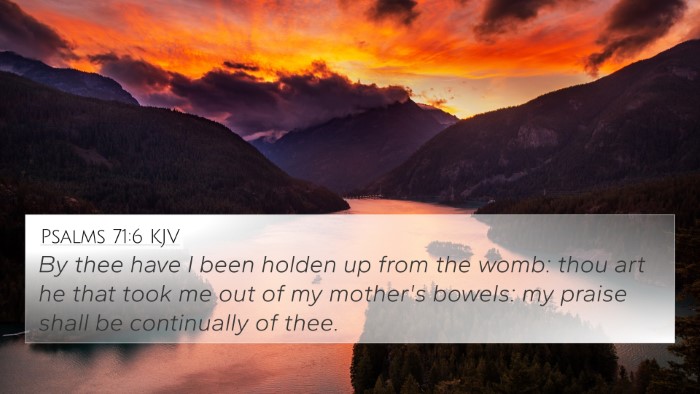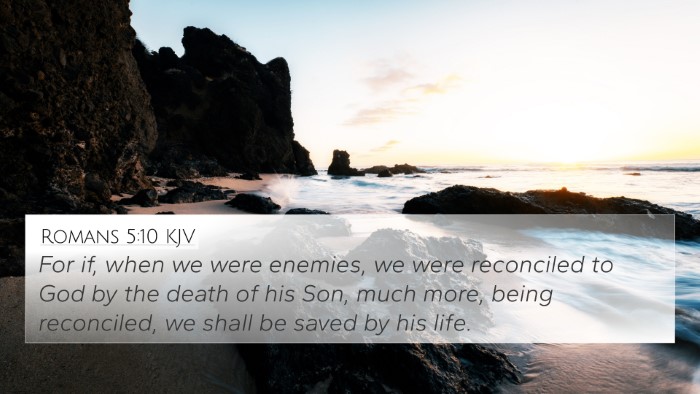Psalms 138:8 - Summary and Meaning
Verse: "The LORD will perfect that which concerns me; Your mercy, O LORD, endures forever; Do not forsake the works of Your hands." (Psalms 138:8)
This verse encapsulates a profound assurance from David that God is committed to bringing His plans for His people to completion. Here, we explore its implications through various public domain commentaries.
Contextual Overview
The Psalmist David expresses his gratitude and confidence in God's providence. This verse stands as a testimony to God’s faithfulness and the assurance that he will finish what he has started in the lives of His believers.
Commentary Insights
-
Matthew Henry:
Henry emphasizes that God's work in a believer's life is continual and progressive. He interprets the phrase "perfect that which concerns me" as God's commitment to fulfill His purpose for individual believers. God's mercy is depicted as eternal, assuring the faithful of His unwavering support.
-
Albert Barnes:
Barnes highlights that the verse encourages believers to trust in God's promises. He interprets "perfect" as God’s ability to bring to fruition what He has started, underscoring the enduring quality of God’s mercies and the plea for God not to abandon His creation.
-
Adam Clarke:
Clarke focuses on the implications of divine mercy and the assurance of God's commitment to His people. He considers the "works of Your hands" as a reminder of humanity’s dependence on God’s grace and the ongoing process of spiritual growth and perfection.
Thematic Connections
This verse resonates with various themes in the Bible, most notably the assurance of God's promises and the importance of divine mercy. Below are examples of Bible verse cross-references that connect thematically or contextually:
- Philippians 1:6: "Being confident of this very thing, that He who has begun a good work in you will complete it until the day of Jesus Christ." - Reflects God's faithfulness in completing His work.
- Isaiah 46:10: "Declaring the end from the beginning, and from ancient times things that are not yet done." - Reinforces God's sovereignty over history and outcomes.
- Romans 8:28: "And we know that all things work together for good to those who love God." - Affirmation of God’s purpose being executed in believers' lives.
- Lamentations 3:22-23: "Through the Lord’s mercies we are not consumed, because His compassions fail not." - Highlights the enduring mercy of God.
- 2 Timothy 1:12: "For this reason I also suffer these things; nevertheless, I am not ashamed, for I know whom I have believed and am persuaded that He is able to keep what I have committed to Him until that Day." - Assurance of divine reliability concerning one’s life and faith.
- Psalms 57:2: "I will cry out to God Most High, to God who performs all things for me." - Affirms God's active role in the believer's journey.
- Hebrews 13:5: "For He Himself has said, 'I will never leave you nor forsake you.'" - Assurance of God's presence thus echoing the plea in Psalms 138:8.
Inter-Biblical Dialogue
Through cross-referencing Biblical texts, we can observe how Psalm 138:8 connects to both Old Testament themes and New Testament promises about God's faithfulness and mercy.
Conclusion
Psalms 138:8 serves as a profound reminder of God’s commitment to complete His works in us, rooted deeply in His everlasting mercy. This verse not only highlights the individual believer's relationship with God, but it also connects to numerous other scriptures that underscore similar themes of divine providence and assurance.
Tools for Further Study
If you want to explore more about bible verse parallels, consider using study tools specifically designed for bible cross-reference guides. Here are some recommendations:
- Bible Concordance
- Bible Cross-reference Study Tools
- Comprehensive Bible Cross-reference Materials
- Bible Reference Resources
Closing Remarks
Understanding Psalms 138:8 through these commentaries and thematic explorations provides richer insight into God’s character and promises. Engaging with scriptural cross-referencing enables believers to find deeper meanings and connections throughout the Bible, reinforcing faith and trust in God’s perfect will.
























